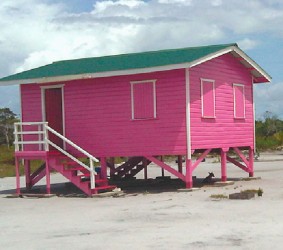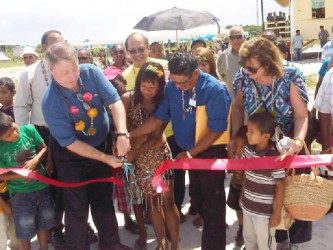Villagers once living in deplorable conditions are now new homeowners in the Swan Amerindian community, along the Soesdyke/Linden highway.
Sixty-five houses were built for villagers under the $80M Food For The Poor (Guyana) Inc. (FFTP) Swan Community Development Housing Project, which was commissioned yesterday.
Villagers congregated at the new Trinity Community Centre for the simple ceremony, where they gave thanks to government,

which gave 40 acres of land for the project, and FFTP, for the work it has done in the community.
The project saw the completion of sixty-five homes. Each consists of two bedrooms, a living area and a sanitary block on the exterior, according to FFTP senior manager Andrea Benjamin.
The project was conceptualised last year as a result of FFTP staffers visiting the area, according to FFTP Manager Kent Vincent. The project was done in two phases. In the first phase, which took place between May and June of 2012, 40 houses were built, while in the second phase, in May to June, this year, the remaining 25 homes were built.
Swan has a population of 510 and its main economic activity is farming, according to village leader James Domingo. Villagers who benefitted all shared the same sentiments about how bad life was when they did not have a house and how comfortable life is for them now. Many told this newspaper that they now expect further development.
Debra Joseph, a 23-year-old housewife who has lived in the community for the past six years, was very grateful for the house.
She also echoed a call by many, including Domingo, for a bus to be donated to the community to transport the children to and from school. She said it costs a lot to send their children to school in the neighbouring village of Kuru Kururu.
Joseph also stated that the village needs more assistance from the government so that villagers can sustain themselves and their families and further develop Swan.

Hazel Clenkian, 43, echoed the same feelings of gratitude as the others. She has been living in Swan for the past year. “We got somewhere we can be happy… it a little small but we happy with it,” the housewife stated, when asked what owning her first home meant to her. The woman also told this newspaper that “progress will come when all come together.”
Elvis Clayto, a 44-year-old entrepreneur told this newspaper that owning his home means a lot to him and that he has plans to extend.
He further stated that he is expecting villagers to live in peace and love with one another as well as keeping their surroundings clean.
Voicing his disappointment that the bus which he lobbied for was not yet granted by the government, Domingo said he remained hopeful that it would be delivered since it is badly needed to transport the community’s children to and from school.
Domingo also stated that he will be pushing self-help projects in order to see fast development in the community.
Although there are no tarred roads in the community, there are well demarcated sand tracks. Residents told Stabroek News that the tracks are bad (“loose”) when the sun is up, while when it rains they can traverse them better since the soil is then compacted.
Meanwhile, representatives of the Ministry of Amerindian Affairs and the Ministry of Housing charged the new homeowners to care what has been given to them. Also delivering a similar charge to the villagers was benefactor Patrick Rainey. Rainey also distributed farming tools to the village and his wife gave stuffed toys to the village children.








